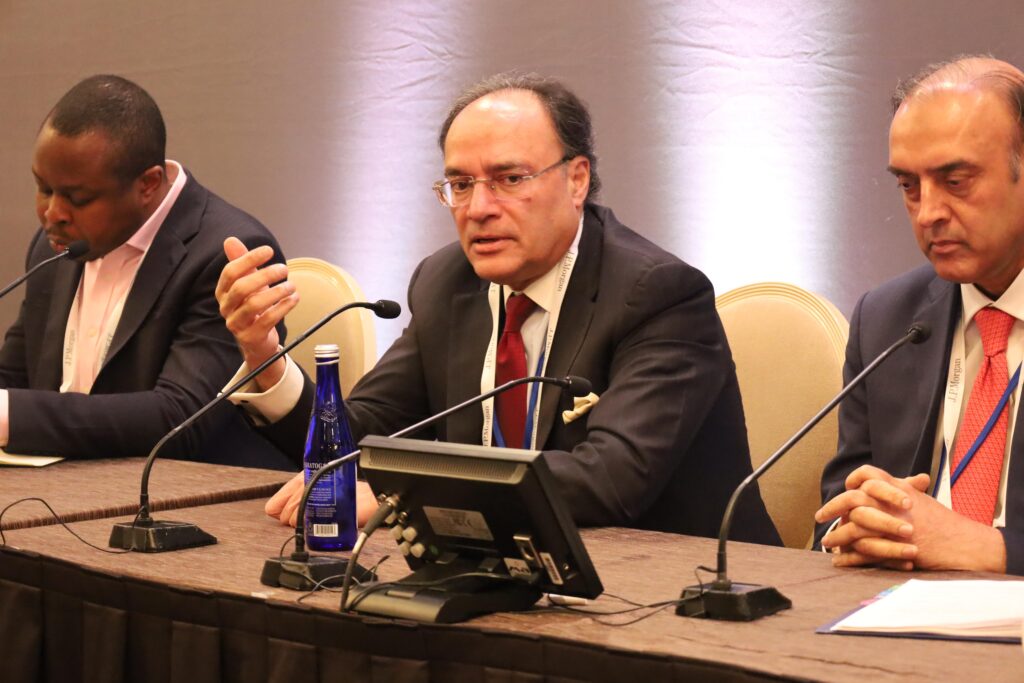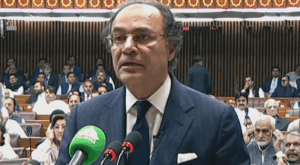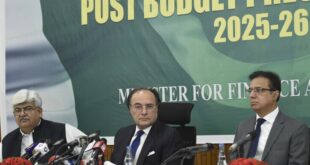
Finance Minister Senator Muhammad Aurangzeb concluded the fourth day of his visit to Washington, for the Spring Meetings of the International Monetary Fund (IMF) and the World Bank with significant progress on economic diplomacy, said an official statement of the finance Ministry here on early Friday morning.
The visit featured high-level engagements that included confirmation of Pakistan’s successful staff-level agreements with the IMF under both the Extended Fund Facility (EFF) and Resilience and Sustainability Facility (RSF), Fitch’s sovereign credit rating upgrade from CCC+ to B-, and growing international confidence in Pakistan’s macroeconomic stability, reform agenda, and digital transformation.
The finance minister also held critical meetings with the heads of leading financial institutions, global corporations, and rating agencies—including VISA, JP Morgan, Moody’s, Fitch Ratings, the Asian Development Bank (ADB), and the World Bank—securing renewed commitments and support for Pakistan’s reform and development programs. Additionally, he advocated for climate finance at the V20 Ministerial Dialogue and reaffirmed Pakistan’s commitment to structural and digital reforms.
The day began with a meeting between the finance minister and Andrew Torre, Regional Vice President of VISA. Minister Aurangzeb expressed his appreciation for VISA’s contribution to the digitalization of Pakistan’s economy and the introduction of various financial products. He welcomed VISA’s decision to triple the size of its office in Pakistan and noted its collaboration with 1-Link and PayPak as a significant step toward promoting financial inclusion, e-commerce, transaction security, and payment gateways, as well as facilitating remittances. He assured Mr. Torre of the government’s full support in addressing any operational matters in Pakistan.
Minister Aurangzeb then met with Christos Harpanditis, Vice President of Philip Morris International. Acknowledging the company’s longstanding commitment to Pakistan, the finance minister highlighted the improving business climate and the government’s taxation reforms focused on people, process, and technology. He emphasized the critical need for effective enforcement and compliance measures to curb the illicit production and sale of cigarettes.
Later, at a seminar titled “Pakistan’s Economic and Monetary Policy Outlook”, hosted by JP Morgan, the finance minister briefed institutional investors on Pakistan’s stable macroeconomic indicators, including twin surpluses, declining inflation, robust foreign exchange reserves, and sound debt management—factors that contributed to Fitch’s recent upgrade of Pakistan’s sovereign credit rating. He also expressed deep concern over the loss of tourists’ lives in a terrorist incident in India and reiterated Pakistan’s unequivocal condemnation of terrorism in all its forms. The session concluded with an interactive Q&A with investors.
In a meeting with Masato Kanda, President of the Asian Development Bank (ADB), Minister Aurangzeb congratulated him on his recent appointment and expressed gratitude for the ADB’s enduring partnership with Pakistan. He acknowledged ADB’s contributions to Pakistan’s development through initiatives such as the Country Partnership Strategy 2026–2030 and budgetary support. Both sides discussed ADB’s project pipeline and agreed on the need to accelerate project execution. The Minister requested ADB’s support for a partial credit guarantee for the issuance of the Panda bond and expressed hope for the materialization of further budgetary support this year. He also confirmed Pakistan’s participation in the CAREC meeting scheduled for November 2025.
The finance minister held separate meetings with Fitch Ratings and Moody’s. In his discussion with Fitch, he expressed appreciation for the recent sovereign rating upgrade to B- and outlined progress on structural reforms in the energy sector, taxation, state-owned enterprises (SOEs), public finance, and debt management. During his meeting with Moody’s, he emphasized Pakistan’s strong economic indicators, including low inflation, fiscal surpluses, and record remittances, while stressing ongoing reforms aimed at broadening the tax base. On trade matters, he reiterated Pakistan’s commitment to constructive engagement with the U.S. Administration.
In his meeting with Sangbu Kim, World Bank’s Vice President for Digital Transformation, the finance minister highlighted progress under the Digital Pakistan Policy—particularly in taxation reforms and the end-to-end digitization of the Federal Board of Revenue (FBR). He emphasized the importance of horizontal integration across government entities and sought the Bank’s support in operationalizing the Country Partnership Framework (CPF) through technology.
At the Vulnerable 20 (V20) Ministerial Dialogue, themed “Enabling Climate Prosperity”, Senator Aurangzeb outlined Pakistan’s Climate Financial Strategy and the development of a Climate Prosperity Plan. He highlighted the recent staff-level agreement with the IMF under the RSF and noted that the World Bank’s 10-year CPF prioritizes climate resilience and decarbonization. The Minister called for reforms in the international financial architecture to support climate-vulnerable nations and stressed the need for capacity-building to develop bankable climate projects.
Senator Aurangzeb also met with members of the Pakistan Bank-Fund Staff Association (PBFSA), where he briefed them on Pakistan’s improving macroeconomic indicators, including the successful IMF staff-level agreement under the EFF and RSF. He discussed the World Bank’s 10-year CPF and its focus on addressing Pakistan’s population growth and climate challenges, reiterating the government’s strong commitment to structural reforms.
In his meeting with Jihad Azour, IMF Director for the Middle East and Central Asia, the finance minister expressed gratitude for the successful staff-level agreement on Pakistan’s economic program. He reaffirmed Pakistan’s resolve to sustain reforms, citing Fitch’s upgrade of Pakistan’s sovereign credit rating as recognition of the country’s ongoing progress.
The finance minister concluded his day with a meeting with the delegation of Standard Chartered Bank, led by Roberto Hoornweg. He appreciated the bank’s role in bridging Pakistan’s financing gap during a critical period and briefed the team on the country’s macroeconomic stability, the privatization program, and plans to re-enter international capital markets following the recent credit rating upgrade.
 BeNewz
BeNewz



